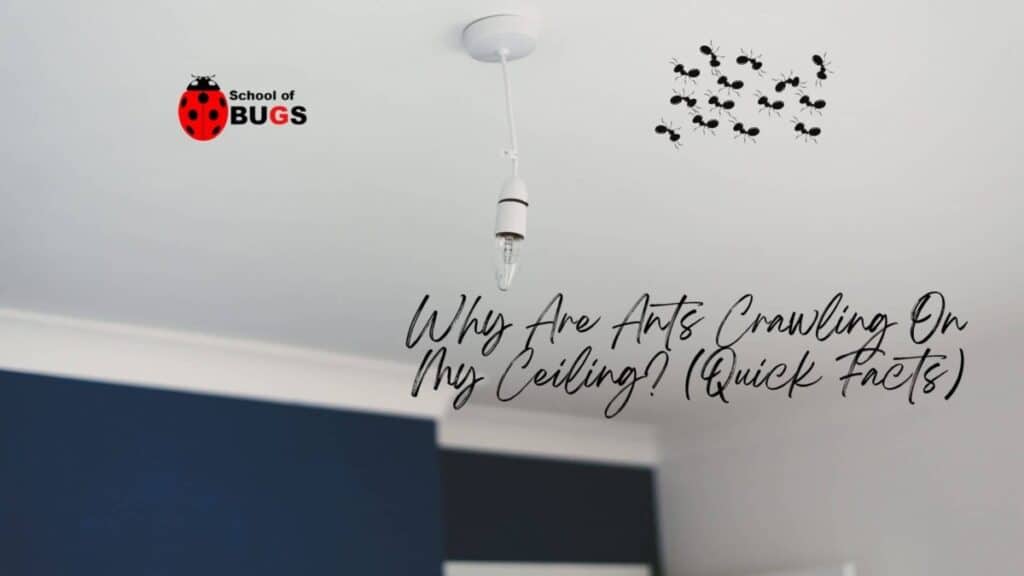
There probably isn’t a specific reason why ants are on your ceiling; it is most likely just the place where they ended up after getting into your house.
But If your ceiling is made of wood, it may attract Carpenter Ants because they are naturally drawn to wood.
The rest of this article will teach you about how ants get in your house and what you should do if they end up on your ceiling.
How do I prevent getting ants on my ceiling?
There are many ways to ward ants away from your house and therefore off of your ceiling. One thing you can do is search for small holes or cracks in walls and windows, because ants will be able to fit through a lot of these.
Once you find the cracks, patch them up with caulking to keep ants out in the future.
Some scents that ants don’t like include lavender, eucalyptus, cinnamon, and peppermint. Getting a diffuser and using these smells is a great way to deter ants from your home and out of any room where they could be crawling on your ceiling.

You could also get the plants of these scents (such as lavender stems or peppermint leaves) and put them near areas where ants could get in.
Another way to prevent ants from getting in is to keep your house clean. Ants are usually looking for food when they come in, and your ceiling is not their last stop.
Cleaning up your dirty dishes, regularly wiping down surfaces, sweeping, and vacuuming are great ways to deter ants because there will be less food and crumbs to attract them.
How do I get rid of ants already on my ceiling?
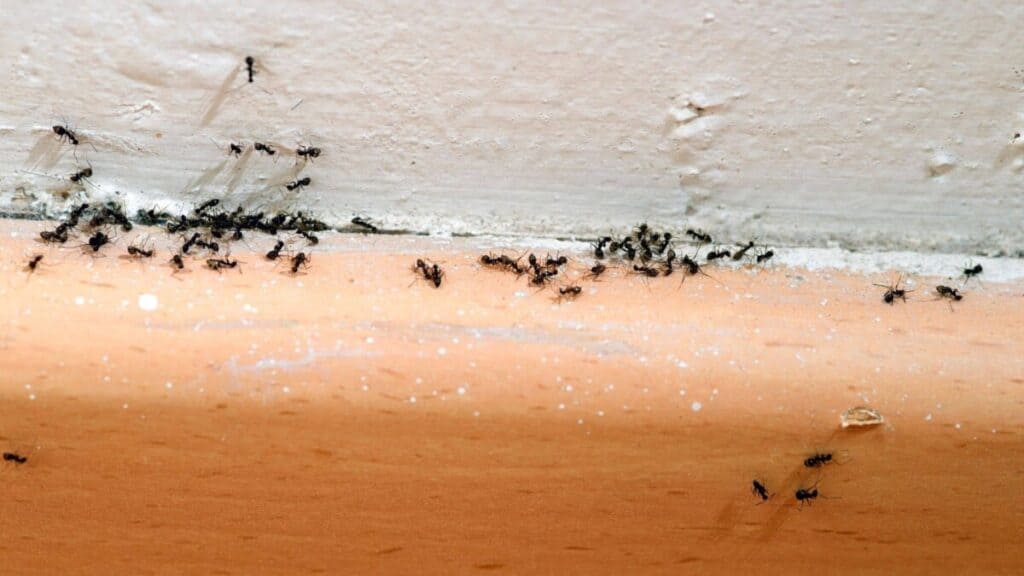
When you are getting rid of ants currently in your home, you first have to follow their trail and try to identify the crack or hole through which they are coming in.
If you can find this spot, patch it up with some caulking to stop more ants from getting in and to deter any new ants in the future.
The best way to now get rid of the existing ants is to use an insecticide spray to kill them. All you will have to do is spray it on the ants that are in your house, then clean them up after they die.
You can clean them up with a broom or a rag and put them in the trash.
If you are worried about having a spray in your house, there are also ant bait options. With ant bait, you just have to open it up and set it out somewhere near the ants.
They will get attracted to it and go to get some, and it will eventually kill them. This method takes a little longer than the spray method, but it works if you’re sensitive to sprays or smells.
Are ants on the ceiling more common in certain months?
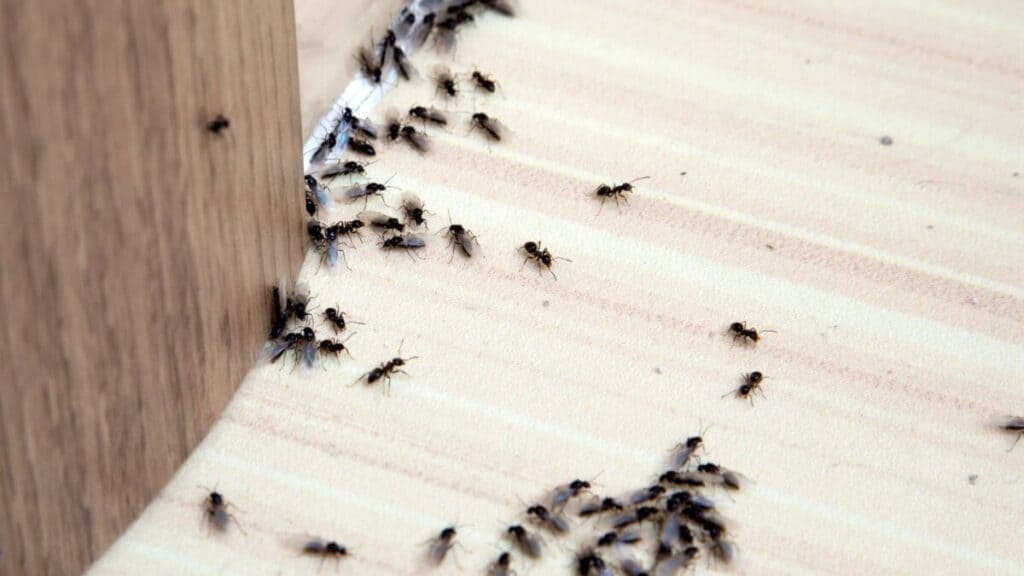
A study was done at Stanford between January 1998 and July 1999 where they had people track when ants invaded their home and under what conditions.
The study found that ants were more likely to go into homes when it was cold and wet, but there was also a smaller peak of invading ants when it was hot and dry.
This means that ants are more likely to invade a home in the winter months, most likely because they are seeking warmth and shelter.
However, when it’s hot and dry outside in the summer months, ants may choose to come into a house because they are searching for food and water or trying to escape the heat.
Either way, there isn’t a set time when ants will be invading your house and it can happen at any time of year.
This study just shows that it might be more likely for ants to come inside in the winter months or when the weather is particularly hot and dry.
Are ants on my ceiling a sign of structural damage to my house?
If you see ants on your ceiling, identify what kind they are. If they are just small sugar ants or odorous house ants, they aren’t going to cause any damage.
They probably got in through a small crack that can be easily scaled up, and a home having small cracks in the walls is very common and no sign for alarm.
However, if you see carpenter ants crawling on your ceiling, that may be a sign that there is damage to your house.
Carpenter ants are notorious for destroying wood and making homes for themselves this way. If you see even one carpenter ant crawling across your ceiling, it would be in your best interest to assume that there are more.

Looking for the source of the carpenter ant is something you can do, and if you find the nest it is crucial that you get rid of it as soon as possible.
Since getting rid of carpenter ant nests is tricky, it’s smart to call someone and get it done professionally. This will ensure that the carpenter ants are gone completely after the job is done.
All that being said, remember that ants can be hard to identify. If you see a big ant that’s about half an inch long or bigger, it is important to check that you don’t have carpenter ants.
But if the ants in your house are small and not carpenters, remember that there is no need to worry about structural damage.
Is it dangerous to have ants on my ceiling?
There isn’t going to be any danger in having common house ants on your ceiling. Ants can be annoying, and some people can also be afraid of them, but they aren’t inherently dangerous.
Ants aren’t coming after you when they invade your home–they are just looking for a warm place or a source for food or water.
Some people worry about ant bites. Though almost all ants can bite, it is very rare for them to do so. If you are dealing with common house ants, the possibility of them biting you is so low that you shouldn’t be worried about it.
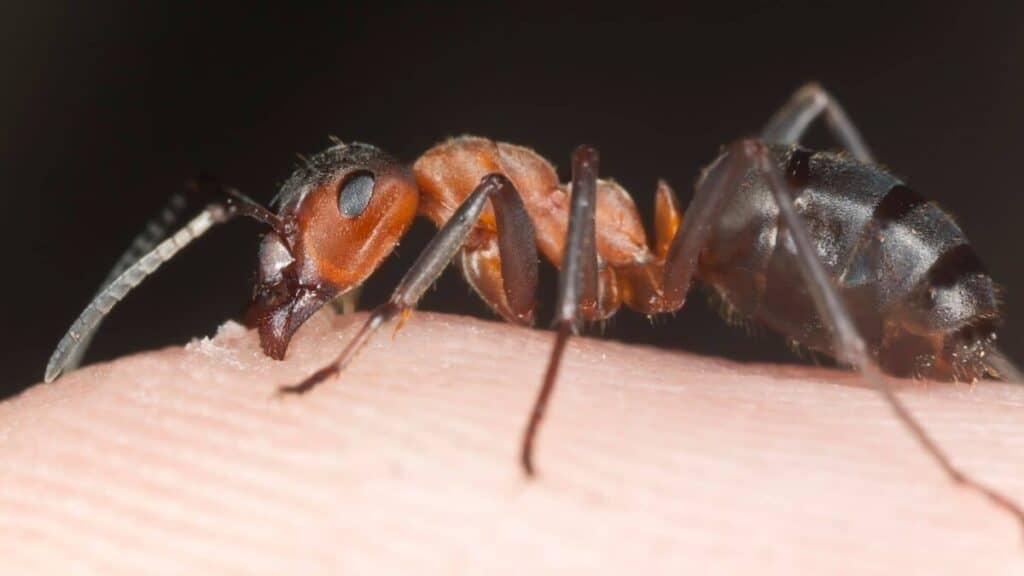
The only reason an ant would bite is if they feel threatened, and even if you are in the room, ants will only feel threatened if you are actively doing something to harm them.
Furthermore, you will barely be able to feel it if you do get bit by a common house ant. Their mandibles are really small and you most likely won’t feel them at all if they do try to bite you.
Household ants are far from dangerous. They are just pesky insects looking for resources in your home.
How do ants stay on my ceiling without falling?
You may be wondering how it’s possible for ants to keep themselves up on your ceiling. Ants are different from humans in the way that they have claws, grippy hairs, and suction pads on their feet that will help them cling to different surfaces. This is what they use to stay on the ceiling as well as on walls.
The main way ants stay on ceilings is with pretarsal adhesive pads, which have a sticky substance in them that comes out when they step on a surface.
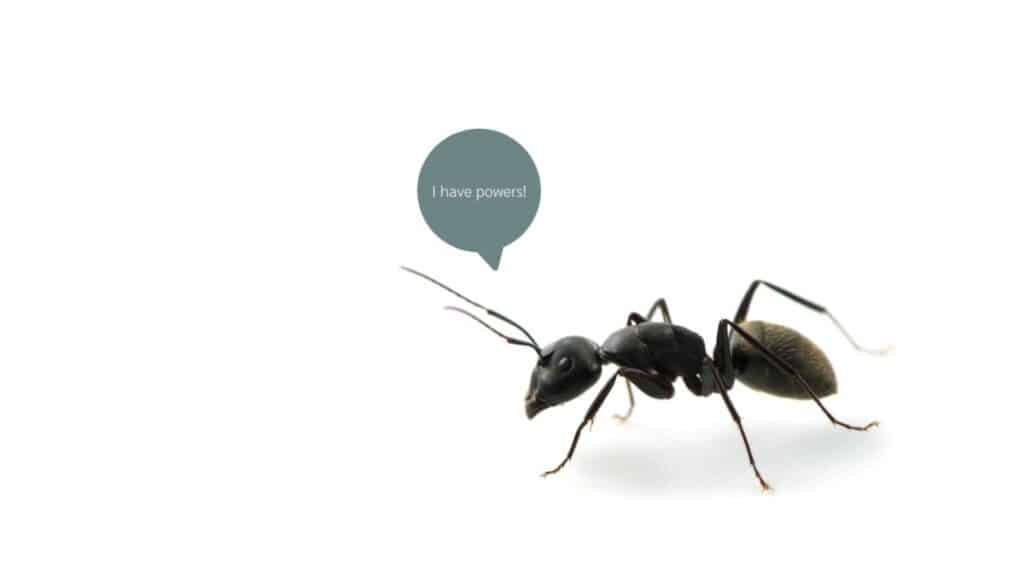
This substance isn’t noticeable to humans, but it plays a primary part in keeping ants from falling off walls and ceilings.
They also have claws that they can use to grip surfaces, and the hair on their feet helps keep them stable.
There are a few things that ants can’t climb, one of which is teflon. This is because it is too smooth and there is nothing for the ant to grip onto.
But ants are overall very impressive with their ability to stay on certain surfaces. They do sometimes fall, though it is pretty rare because they are so well versed in the craft of staying on walls and ceilings.
Conclusion
Overall, there is no reason that ants are crawling specifically on your ceiling. Chances are they are just passing through on their scavenge to get somewhere with resources that they need such as food and water.
There are ways you can prevent ants from crawling on your ceiling such as plugging possible entry points, regularly cleaning, and putting out natural scents to deter them.
You can get rid of existing ants with a bait or spray.
Ants are most likely to be found in your house during cold, dry months, but that doesn’t mean you won’t find them during other times.
If you find carpenter ants in your house, it’s best to make sure you put a stop to them as soon as possible.
In the end, finding common house ants in your home isn’t going to be a problem as they are relatively easy to get rid of.
Just remember that ants aren’t dangerous, and unless they are carpenter ants, you don’t have anything to worry about when you find them.
Alright, that’s it for this article, here are a few hand-selected articles that you might also find interesting reads:
11 Simple Ways to Get Rid of Ants FastWhat Kills Ants Easily? 7 Proven Techniques
What Are Ants Attracted To? Sugar | Plants | Heat | Damp
Recent Posts
Tiny Black Bugs in Bathroom NO WINGS: What They Are and What to Do!
Finding tiny black bugs in your bathroom can be uncomfortable, to say the least. Especially if they are persistent, or they appear in very large numbers, which they often like to do. When it...
Tiny Black Bugs in Plant Soil - What Are They & What To Do About It
A short horror story: You get a new houseplant. You do your best to take care of it. You’ve ensured that it has the right soil, the right amount of sun, it gets enough water. And then one day, you...

